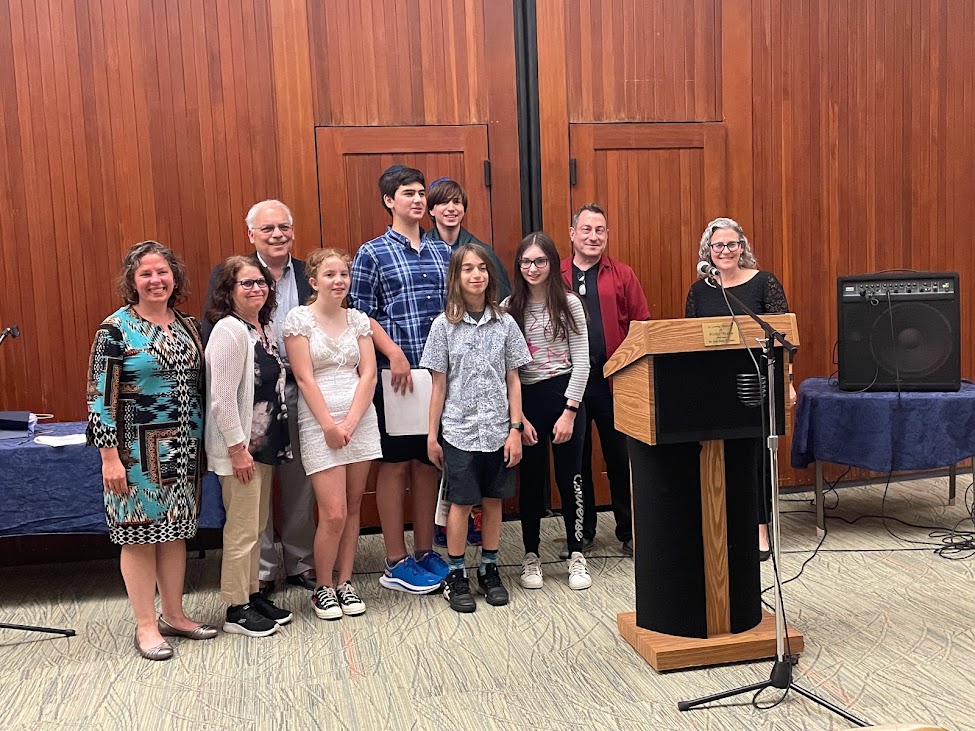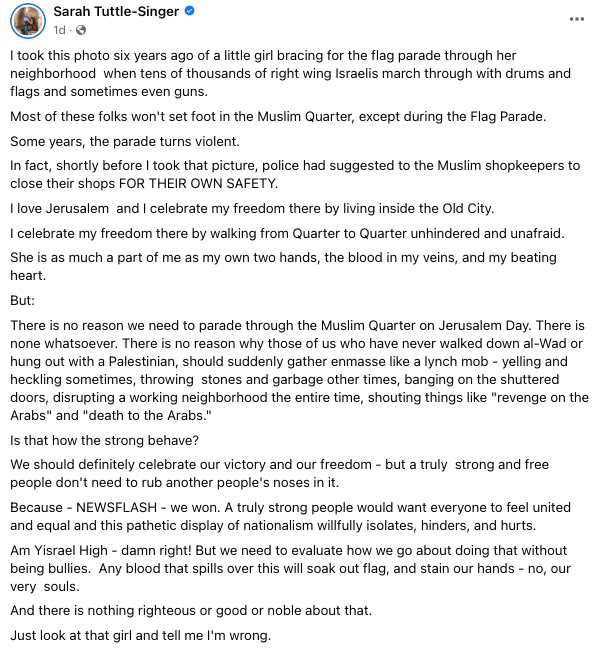In This Moment This Shabbat-O-Gram is sponsored by Robyn and Mark Winarsky in honor of their son, Benjamin, becoming a Bar Mitzvah. Mazal tov!
|
|
Shabbat Shalom With all the sadness of this week, let's begin with some of the joy on the faces of our beautiful children at last weekend's end-of-year assembly and Friday's family service. See more photos in our album, and you can also find screenshots, video and the dvar Torah from Jacob Lederman's Bar Mitzvah here.
The unthinkable images coming from Uvalde, Texas deepen our resolve to protect these children, and all children, though the deck seems irredeemably stacked against us. It keeps on happening, again and again and again. There have been 27 school shootings just this year, to say nothing about the other shootings, at supermarkets, on subways, in places of worship, virtually anywhere.
When Newtown happened, we thought Congress would have to act. These were kids, after all. And then Parkland...again, children. But they failed us then and there are no signs of change, even after this. Still we can't give up. Martin Luther King said, "We must accept finite disappointment, but never lose infinite hope.
Murder - Rinse - Repeat, and the Most Gruesome Verse in the Bible
This week's Torah portion of Bechukotai contains a particularly dystopian vision of a society gone awry. It's known as the Tochecha (rebuke). The people are warned of the consequences of their neglect of the mitzvot of the Holiness Code, those laws designed to promote a just society. One of those warnings is particularly gruesome - and fitting for this week - Leviticus 26:29. |
|
Nineteenth century preacher Charles Haddon Spurgeon called this verse a "blister" that most people would prefer to have been left out of the Bible. But it's there and can't be ignored. This verse, and the Tochecha as a whole, serves as a needed wake-up call at a time when we would prefer to avert our eyes and change the channel. We can't allow ourselves to do that.
To be sure, we cannot really ascribe the fault of this massacre to ourselves. None of us is capable of such an incomprehensible evil. But the Baal Shem Tov isn't saying that. What he's saying is that now that we have seen the "ugliness" - and there is nothing more ugly than what we've seen in Texas in Buffalo these past few weeks - if we do nothing to stop it, THAT'S when the fault can be seen in ourselves. If we give up hope, we would have no one else to blame.
This can change. We must change it. If we give in to the apparent inevitability of a next massacre, we will be complicit if and when it happens. Targum Jerusalem comments on this Leviticus verse, saying, "How evil that guilt, and how bitter those sins, which caused our ancestors in Jerusalem to eat the flesh of their sons and their daughters!" The sins were already evil, even before the cannibalism took place. So what sins could cause such an unthinkable act to become plausible? Apathy. Apathy, which is borne of dulled senses.
|
|
We need to ritualize the grief and put it into words - and then turn those words instantly into action. No time for simple, routinized "thoughts and prayers," not only numb the senses, they paralyze us, fooling us into thinking that a few well-chosen words can substitute for action.
As Rabbi Ruth Gan Kagan put it, “Biblical Hebrew is all made out of verbs…it all starts in the doing and goes back to the doing. Why isn’t there a blessing for giving tzedaka to the poor? By the time you say the blessing, the man will die of hunger… spirituality cannot just be in what you think and what you feel – it has to be invested in what you do.”
At the bottom of this email, I've clipped today's Boston Globe editorial, which is a compilation of quotes from other editorials that have followed the many mass shootings we've endured over recent years. These atrocities have become so routine that the editorials literally write themselves. We've run out of original thoughts to express the outrage. We need to find those thoughts and create new words, new ways to express outrage, much as the novelist David Grossman searched for a new language in which to explain the Holocaust in his book, See Under: Love. Of that book, the New York Times reviewer wrote, "Talking about hell on earth requires a reexamination of narration itself." We need a new language to respond to a catastrophe like this week's. And we need to be jarred into action.
Leviticus 26:29 arrives just in time to shock us out of our dazed stupor, to remove us from the endless loop of xeroxed massacres. Murder - Rinse - Repeat. The NRA wants us to be dulled into silence and assumes this thing will soon blow over, as it always does. The formula is tried and true; it was employed after Sandy Hook. Simply delay and obstruct, under the pretense of showing respect for the dead by "not politicizing" this tragedy - i.e., not taking constructive action. And then wait for the nation to move on to the Next Big Thing, or just expect that they will become numb to the pain.
We must not be numbed. Not while the flesh of our sons and our daughters is being eaten alive.
Here is a special kaddish from Ritualwell for us to recite this week, followed by a quote from Lamentations 1:16. |
|
Our thanks to Aviva Maller Photography |
|
"The Netanyahus" Wins a Pulitzer
In the midst of everything else that has been happening, this past week offered some very big news on the Jewish culture front. Joshua Cohen's novel, "The Netanyahus: An Account of a Minor and Ultimately Even Negligible Episode in the History of a Very Famous Family" won the Pulitzer Prize in literature. I read "The Netanyahus" last year and was grabbed by Joshua Cohen's spot-on take on the post-war fissures between American Jews and Israelis. The book is also wildly entertaining, if at times pretentious (bring your dictionary), and it imparts some important truths about Jewish identity. And now it has won the Pulitzer, putting Cohen up in the stratosphere of Roth, Bellow, Chabon and Malamud - and making this book, which was rejected by over a dozen publishers, a must-read for American Jews. Click here for the NYT review. And listen to this podcast interview with Cohen from Ha'aretz.
I've excerpted a few of my favorite passages from the book. Some are below and others have been posted on my website. Not only is this novel supremely entertaining for its depiction of the preteen Bibi as an insufferable brat, but also in its portrayal of Bibi's father's revisionist history as an important if somewhat maniacal view that should be taken seriously. His idea was that the Spanish Inquisition did not actually force Jews to convert. They hated Jews so much that they preferred to persecute them rather than convert them. It's intriguing, though few took him seriously as a scholar (Bibi somewhat rewrote his father's hagiography later on). But Cohen does at least treat the obnoxious Benzion's ideas with enough respect to challenge the American Jewish professor who hosts him. Cohen quotes "The Big Lebowski" in the Ha'aretz interview, in speaking of the elder Netanyahu, "He's not wrong, but he's still an a--hole."
Here's a sampling of my favorite passages:
Just about a decade prior to the autumn I’m recalling, the state of Israel was founded. In that minuscule country halfway across the globe, displaced and refugee Jews were busy reinventing themselves into a single people, united by the hatred and subjugation of contrary regimes, in a mass process of solidarity aroused by gross antagonism. Simultaneously, a kindred mass process was occurring here in America, where Jews were busy being de-invented, or uninvented, or assimilated, by democracy and market forces, intermarriage and miscegenation. Regardless of where they were and the specific nature and direction of the process, however, it remains an incontrovertible fact that nearly all the world's Jews were involved in mid century and becoming something else; and at this point of transformation, the old internal differences between them – a former citizenship and class, to say nothing of language in degree of religious observance - became for a brief moment more palpable than ever, giving one last death rattle gasp. (P.51)
The history of Zionism is so difficult to recount, and all attempts evanescence into metaphysics. Socialists, communist, anarchist, Zionists – think of how many identities Jews had to assume over the course of the modern era only in order to be what they were, to be Jews again… But this time to be Jews freely… (P.81)
This next passage comes from Benzion Netanyahu's guest lecture at an American college. The questions he asks are valid. What happens when Israel the dream, the myth, comes crashing back into history and becomes all-too-real?
“When it came to chronicling Jewish life, what difference could there be between Rome and Greece and Babylon? Were they all just ultimately variations on Egyptian bondage, and all of their rulers essentially incarnations of the Pharaoh? Through this process of repeatedly relating the Bible to the present, history was negated; the more the stories were repeated – every weekly recurrence of the Sabbath, every annual recurrence of a holiday – the more the past was brought into the present until the present and past were essentially collapsed and each next year was rendered identical to the last, with all occurrences made contemporary. This collapsing of time in part of a certain messianic quality both to the daily lives of individual Jews and to the collective spiritual life of the Jewish people. In other words, through interpretation these preservers of God‘s word were preserved themselves. Take, for instance, Zion, a historical kingdom that in its destruction was transmuted into myths, becoming in the Diaspora a story and poetic trope that reign supreme in the Jewish imagination for millennia. The world is full of real events, real things, which have been lost in their destruction and are only remembered as having existed in written history. Because it was remembered not as written history but as interpretable story was able to exist again in actuality, with the founding of the modern state of Israel. With the establishment of Israel, the poetic was returned to the practical. This is the first example ever in human civilization in which this happened – in which a story became real; it became a real country with a real army, real essential services, real treaties and real trade pacts, real supply chains and real sewage. Now that Israel exists, however, the days of the Bible tales are finished and the true history of my people can finally begin and if any Jewish question remains to be answered it’s whether my people have the ability or appetite to tell the difference.” (P171)
Any book groups looking to read a book that won the most important literary prize in America? Let me know - I'd love to discuss it. |
|
Remember that services this Friday night are at the special time of 7 PM. Beginning next week, June 3, which is our Pride Shabbat, services will be at 6 PM and, weather permitting, outdoors (or in the tent) throughout the summer. |
|
Whoever destroys a soul, it is considered as if he destroyed an entire world. And whoever saves a life, it is considered as if he saved an entire world. (Mishnah Sanhedrin 4:5; Yerushalmi Talmud 4:9, Babylonian Talmud Sanhedrin 37a)
The opposite of good is not evil; it is indifference (Elie Wiesel)
Some are guilty, but all are responsible. (Abraham Joshua Heschel)
Do not stand idly by the blood of your neighbor (Lev 19:16)
And this, from Rabbi David Saperstein of the Religious Action Center:
Our legislators and the gun lobby want to blame everyone but themselves. The problem, they say, is mental illness. On the one hand, tautologically, mass murderers are emotionally disturbed. On the other, the compelling evidence testifies that the overwhelming percentage of those with mental illness are not violent and those who are violent are far more often a danger to themselves than to others. More compellingly, in Canada and Japan, there are people with the same mental illnesses as here in America but they don't pick up their mother's legally obtained Bushmaster and randomly shoot people.
- How Politics Poisoned the Evangelical Church - The movement spent 40 years at war with secular America. Now it’s at war with itself. (Atlantic) See also: How the 'apocalyptic' Southern Baptist report almost didn't happen. Also: Key takeaways from the bombshell sex abuse report by Southern Baptists (WaPo) Southern Baptist leaders for decades both ignored and covered up sex abuse allegations while claiming to have little power to address them, a shocking third-party investigation released Sunday found. The nearly 300-page report included confidential emails and memos between longtime lawyers for the 13-million member denomination and leaders of the Southern Baptist Convention’s administrative arm. The product of an eight-month probe requested by Southern Baptists at their annual meeting in Nashville in 2021, it includes several key takeaways.Southern Baptist leaders covered up sex abuse, kept secret database, report says]1. Top leaders repeatedly tried to bury sex abuse claims and lied about what they could do 2. A former SBC president was considered “credibly accused” of sexual assault 3. Unheeded warnings went on for decades 4. Leaders seemed to put concern over potential litigation over people’s safety
- Memorial Day was originally a day to remember war dead ("Memorial" Day...get it?), before it became an occasion for car sales, beach trips and barbecues. Maybe this year we can regain some of the deeper meaning of this special weekend. I hope that each of us will take a moment to recall those who have made the supreme sacrifice. As I have in prior years on Memorial Day weekend, I share with you the words of Rabbi Roland Gittlesohn in a speech delivered at the dedication of the 5th marine cemetery on Iwo Jima, in March 1945. The speech, called "The Highest and Purest Democracy," has been called one of the great battlefield sermons to come out of World War Two.
Here lie men who loved America because their ancestors generations ago helped in her founding, and other men who loved her with equal passion because they themselves or their own fathers escaped from oppression to her blessed shores. Here lie officers and men, Negroes and whites, rich men and poor . . . together. Here are Protestants, Catholics, and Jews together. Here no man prefers another because of his faith or despises him because of his color. Here there are no quotas of how many from each group are admitted or allowed. Among these men, there is no discrimination. No prejudices. No hatred. Theirs is the highest and purest democracy ... Whosoever of us lifts his hand in hate against a brother, or who thinks himself superior to those who happen to be in the minority, makes of this ceremony and the bloody sacrifice it commemorates, an empty, hollow mockery. To this, then, as our solemn duty, sacred duty do we the living now dedicate ourselves: to the right of Protestants, Catholics, and Jews, of white men and Negroes alike, to enjoy the democracy for which all of them have here paid the price ... We here solemnly swear that this shall not be in vain. Out of this and from the suffering and sorrow of those who mourn this will come, we promise, the birth of a new freedom for the sons of men everywhere. |
|
Shabbat Shalom!
Rabbi Joshua Hammerman Below is an editorial from today's Boston Globe |
|
Temple Beth El 350 Roxbury Road Stamford, Connecticut 06902 A Conservative, Inclusive, Spiritual Community |
|
|
|






























